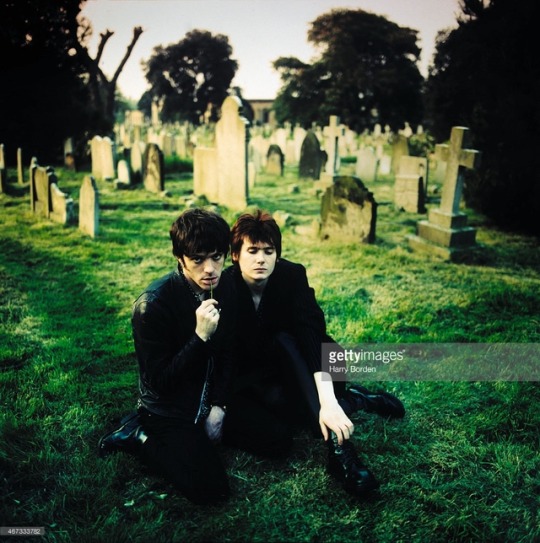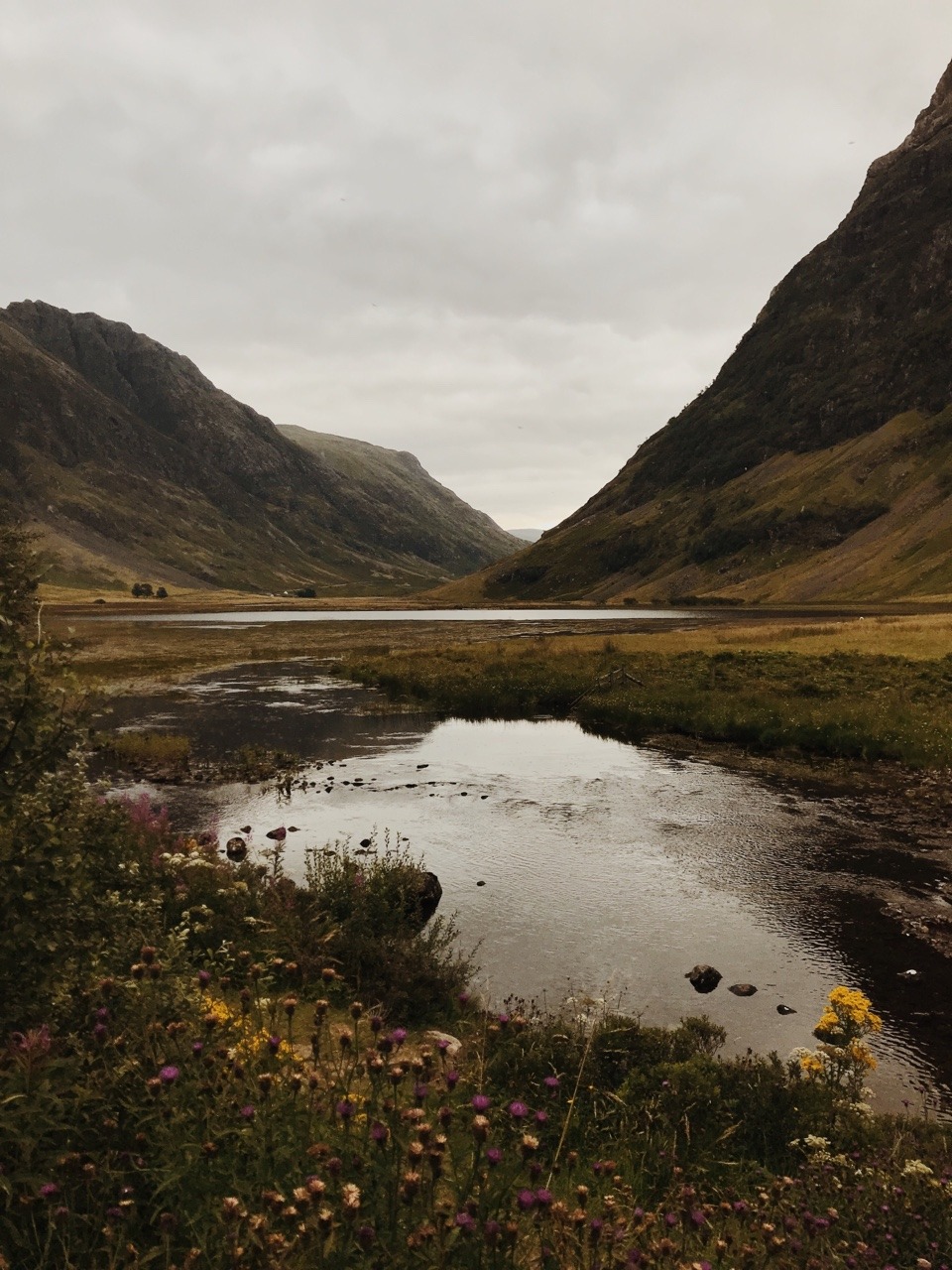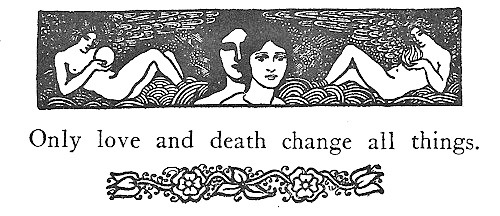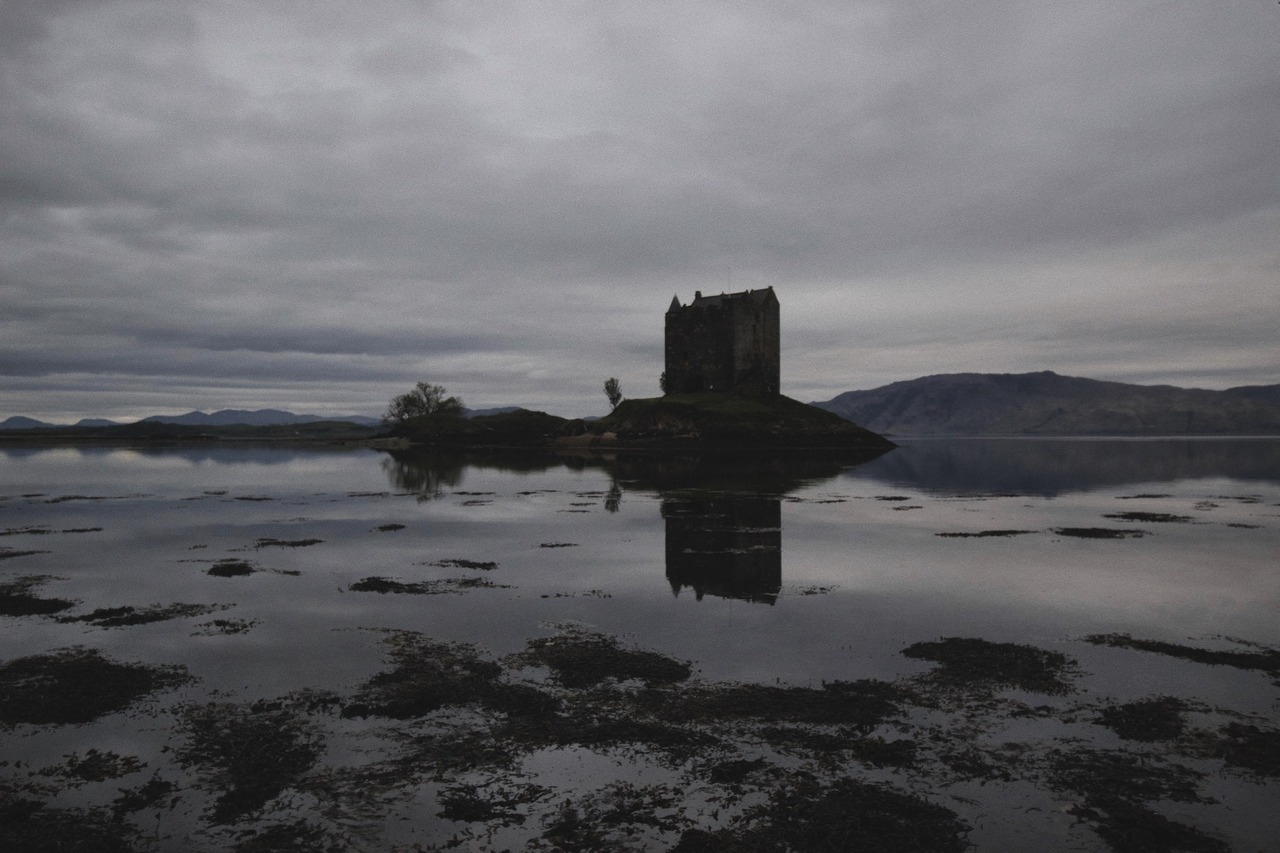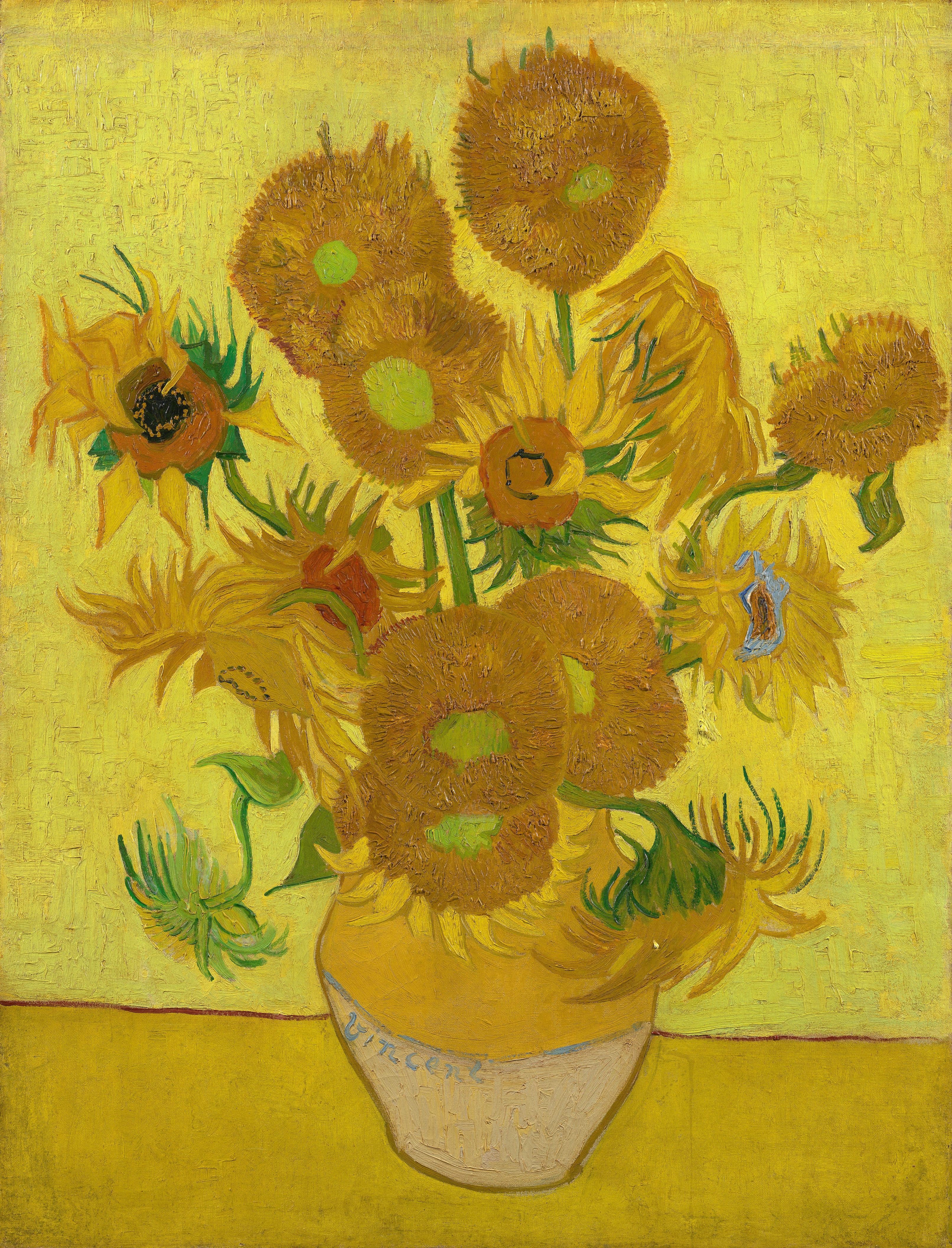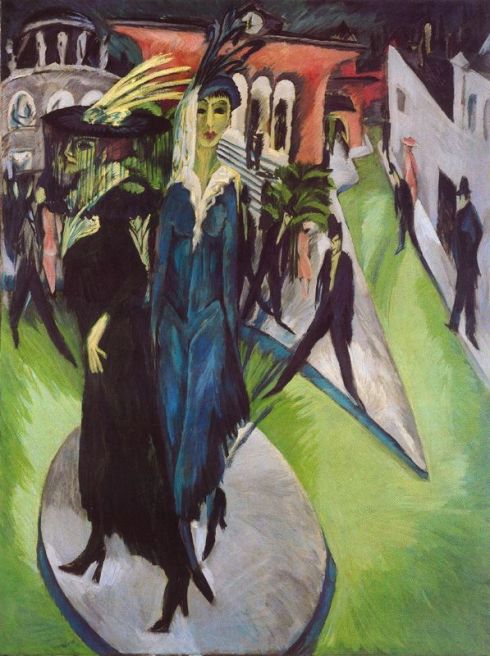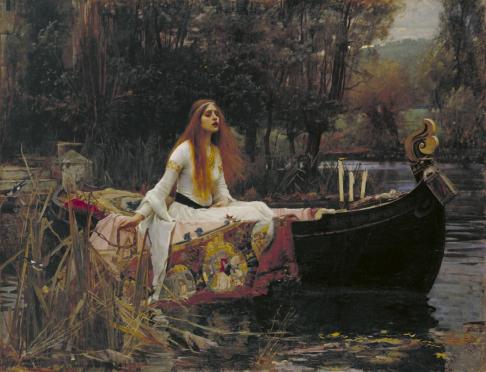Today is a very important day for me, almost like a second birthday to me. On this day, 22nd February, five years ago I discovered my favourite band: Manic Street Preachers. It was a life changing moment for me. I remember it well, and I don’t remember the moment I discovered every single band; on that grey late winter morning I first listened to their song Little Baby Nothing. I found it catchy but nothing more. The video featured only the singer, and the mystery of the band was yet to unravel. I ended up listening to it many times that morning and that same afternoon I was already listening to their first album obsessively over and over again, and then the second and the third….
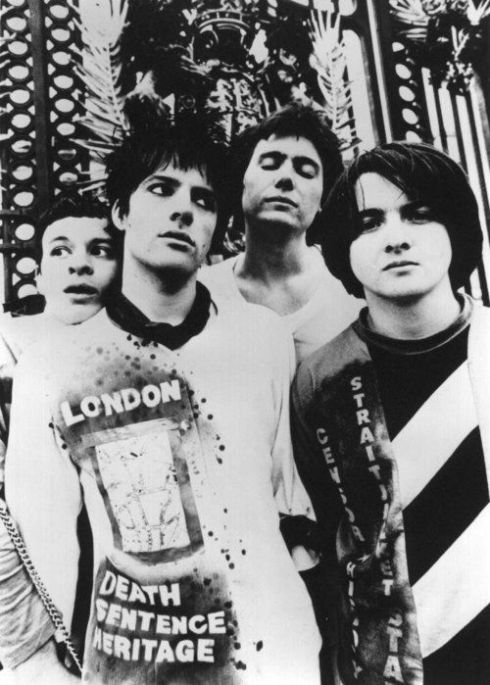
Manic Street Preachers are a Welsh band formed in 1986, and originally consisted of four guys, James Dean Bradfield, Richey Edwards, Nicky Wire and Sean Moore who were mates since they were kids. The band is still active, although without Richey Edwards who disappeared in February 1995. The band truly sprang from their lovely friendships and a shared feeling of angst, frustration of living in a small town and love for rock ‘n’ roll and literature. I love the fact that they had and have such nice, warm and lasting friendships, and I dreamed of having that myself. They released their first single “Suicide Alley” in 1988, and both the song and the cover photo were an unmistakable homage to one band they loved and looked up to: The Clash. In January 1991 they released a significant single that musically and lyrically served as a prelude for things which were to come: “Motown Junk” which shows both the band’s disdain for old music (the title is a reference to Motown classics) and their love for the American hip-hop group Public Enemy whose sampling serves as the intro for “Motown Junk”. The lyrics show the typical teenage boredom and saturation with culture and everything else:
Never ever wanted to be with you,
The only thing you gave me was the boredom I suffocated in,
Adrift in cheap dreams don’t stop the rain,
Numbed out in piss towns,
Just want to dig their graves
Motown, Motown junk
I laughed when Lennon got shot,
Twenty one years of living and nothing means anything to me.
The same year they started releasing singles such as “Love’s Sweet Exile”, “You Love Us” and “Stay Beautiful” to name a few, that were to become songs on their infamous debut album “Generation Terrorists” released in February the following year.
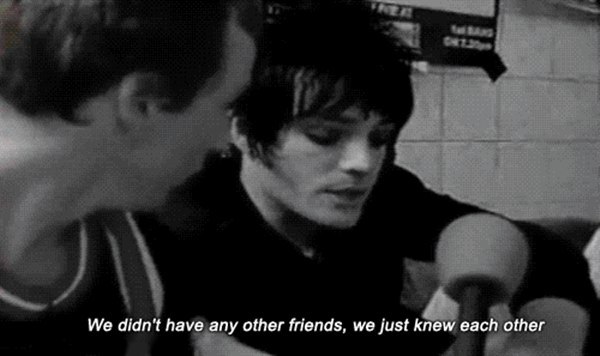
Bored, alienated, angry, smart and glamorous, a self-proclaimed “mess of eyeliner and spraypaint”, in the early 1990s the Manics were a band that everyone loved to hate, and they, by no surprise, hated everyone in return. They despised their surroundings and deemed everything worthless and even slagged off the bands whose records they owned, such as The Stone Roses. Even the negativity of the song “Motown Junk” is just a performance because Richey later admitted to liking the Supremes and Otis Redding, saying that “everyone has a softer side”. Manics’ original plan was to make a double album which would sell 16 million copies and reach Number 1 worldwide. After they achieved their grand plan, they’d split up, declaring “The most important thing we can do is get massive and then throw it all away.” The album failed miserably in America where grunge bands like Pearl Jam and Nirvana were all the rage. Their debut album was an eclectic collage of everything they loved and everything that inspired them. A true musical diary of miserable teenage years; sadness and boredom coated in glamour.
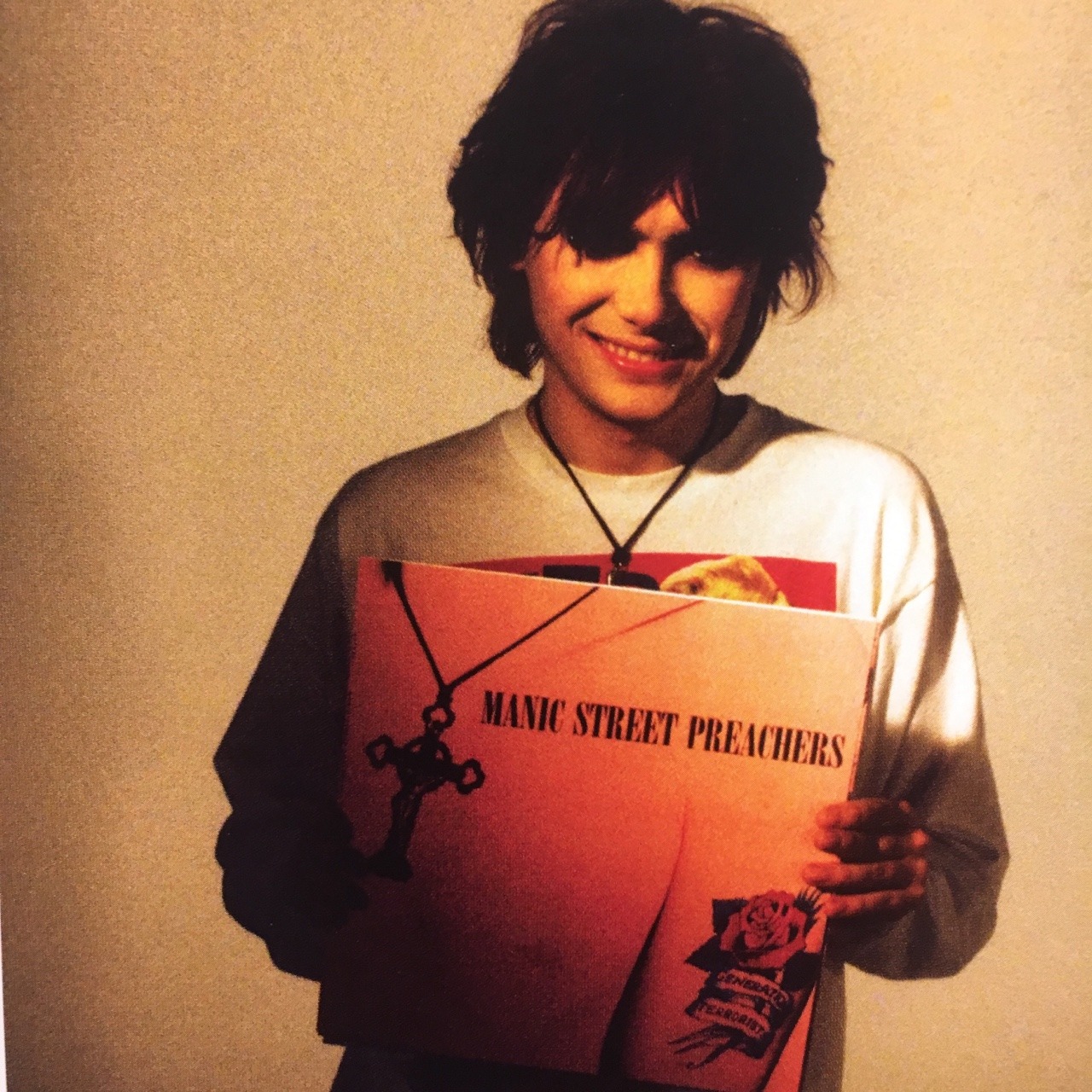
Nicky with their first album, photo by Tom Sheehan, found here.
It brought everything I needed and wanted into my life; the combination of angry guitars and intellectual lyrics, provocative videos and interviews, stylish “glam-twins” as Richey and Nicky were called, wearing black eyeliner and tight white jeans. And the album had a slight over the top-DIY feel to it; as the British magazine The Quietus said later on: “It had to sound passé, it had to be overdone; if you’re trying to bulldoze the shiny edifice of western pop culture, you can’t do it tastefully or with subtlety, can you?” That’s exactly what instantly appealed to me about the Manics; their mix of trashiness with an intellectual knowledgeable basis. They could be giving slightly arrogant provocative statements in press or be deliberately shocking in videos, blending genders and adding a hint of eroticism, but in reality they were well-read and thoughtful individuals, and this combination together gives a whole different appeal than the bigmouth Liam Gallagher in his interviews where every other sentence is “d’ya know what I mean?” The theme of the lyrics switches back and forth from the criticism of capitalism and materialism to more introspective topics which were to prevail in albums to come.
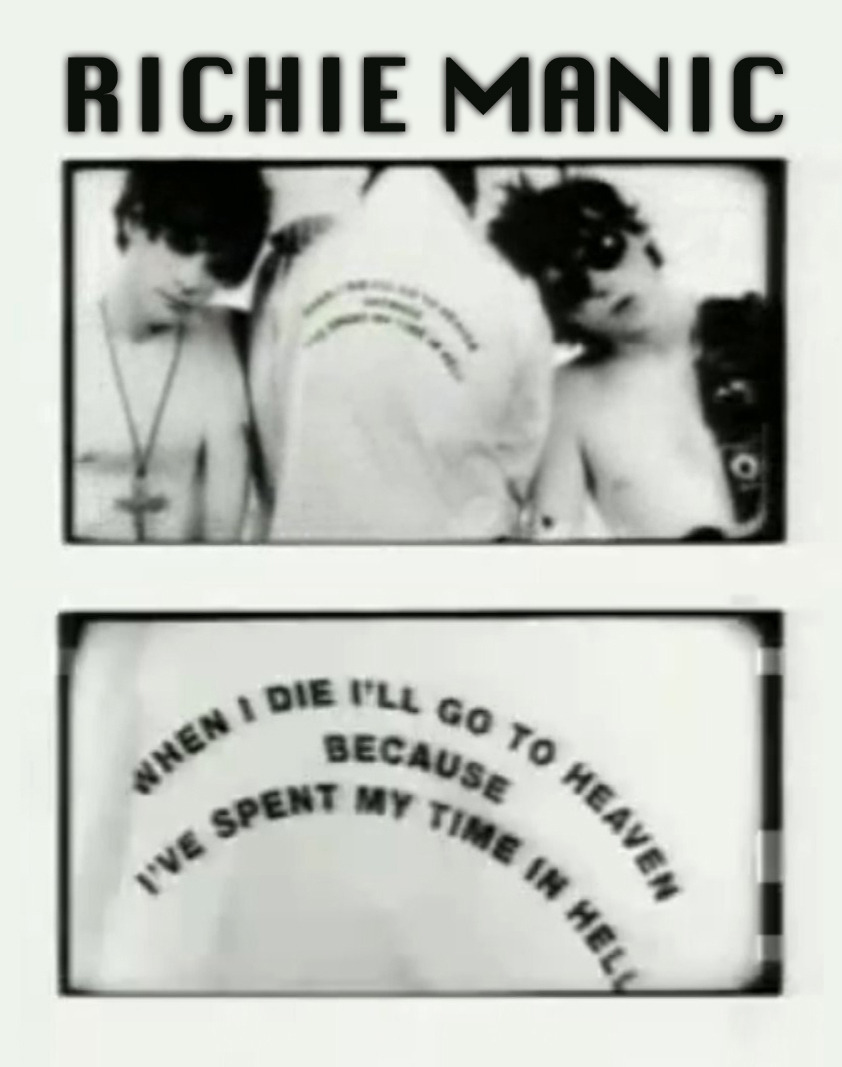
A still from the video “Love’s Sweet Exile”
I was a shy, bookish and slightly clueless individual, and discovering Manics was like getting a direction in life, or more like a guidance on how to be a teenager from someone who knows it all too well. At first I was so captivated by the music alone that I stopped doing everything else, suddenly nothing mattered and I lived through their music, voraciously watched their interviews, read articles about them, searched their photographs, and even ceased writing posts for a while. I spent the next few months in a trance, living in the melodies and lyrics. As time passed, this mad blind passion did not subside but rather branched into more interests; I began to take some of my classes in grammar school seriously, I rediscovered my love for writing essays, I relished in studying sociology and politics because it all led me to the Manics again.
With all the cultural references included in their songs, listening to Manic Street Preachers takes you on an exciting trip; poems by Rimbaud and Jack Kerouac’s “On the Road”; both awoke in me a wanderlust that I tried to tame with endless long walks on the meadows, woods and by the river. Walking around my boring humdrum small town and enjoying the rare delights of nature in it seemed to be the only thing that eased my restlessness and a sudden overflowing enthusiasm for life.

“I wanna sing about a culture that says nothing. I wanna say the fact that basically all your life you’re treated like a nobody.” (Richey)
I craved excitement, and every new day brought the possibility of it. Rimbaud made me daydream of freedom and an idyll of the countryside with its barley fields and murmuring brooks, and Kerouac on the other hand, with his sad and romantic tales of trips around America and wild adventures with his eccentric friends, left me with a glamorous vision of the world which still hasn’t left me. The melodies of Manics’ songs followed me on every step. At home I would sit on my windowsill and write poetry, getting lost in the beauty of pink sunsets and spring rains, the smell of the lilac tree in my garden would make me delirious. I listened to the Manics every single day, and they took me on a glorious ‘book adventure’; I wanted to read everything that inspired Richey, and I did. I wanted to read everything Richey read and enjoyed, and thanks to him I have discovered some wonderful books which have become my personal favourites: “No Longer Human” by Osamu Dazai, “Thirst for love” by Yukio Mishima, “Naomi” by Junichiro Tanizaki, Vladimir Nabokov’s “Lolita”, plays by Tennessee Williams, “1984” by George Orwell, “The Rules of Attraction” by Breat Eason Ellis etc.
Manics sparked in me a desire for self-expression, thirst for knowledge and taught me critical thinking. In my school essays I saw a unique opportunity to express my thoughts, and so I wrote them with passion. It’s a bit ironic, because the Manics were so miserable and depressed in their early years, but they gave me a lust for life, a passion, a purpose, and during that short period in time, I really saw life through rose-tinted glasses, and I was unbelievably self-confident and carefree. Their music filled me with passion that inspired me to write this blog, and even gave me a direction; I had found my mission at last. Everything had a strong impact on me; a song, a colour, a sunset, a line in a poem. I felt like I was on an acid trip every day. The awakening of nature in spring coincided with the awakening of my soul: I felt as if I had lifted the misty veil of childhood and entered the teenage years.

“I have a very childlike rage, and a very childlike loneliness.“ (Richey)
Richey became my teacher and I was a diligent pupil, learning not only the books and politics, but also the art of being melancholy and glamorous. My lessons on Orwell and Dazai would be incomplete had I not mastered the art of putting on a black eyeliner around my eyes and donned something appropriate on. It’s clear by now from the pictures that Manics loved looking cool and expressing themselves through clothes too. They changed fashion styles from album to album, and I love their first glam phase the most when they wore white jeans, leopard print coats, shirts with floral prints or hand written slogans such as “Death Sentence Heritage”, “I hate American rock”, “Rock ‘n’ Roll suicide”, “Sensitivity”, “Spectators of suicide” and “Culture of destruction”, bracelets, messy hair, and occasionally red lipstick too.
Richey and Nicky were a perfect pair of faces to have on the wall of my bedroom where I simply sat and read and did things that are generally in life considered to be rather negative, just as Morrissey said in one interview. I like pretty things, and Richey was unbelievably gorgeous in all the pictures I’ve seen. His face, with dark doe eyes and a sad gaze appeared as melancholy as Modigliani’s portraits of Jeanne Hebuterne, and with his killer cheekbones he looked as heroin chic as Kate Moss, whose picture he liked to gaze at. This is what Richey had to say about fashion: “If you’re hopelessly depressed like I was, then dressing up is just the ultimate escape. When I was young I just wanted to be noticed. Nothing could excite me except attention so I’d dress up as much as I could. Outrage and boredom just go hand in hand.”
Manics sounded great, looked great, and had plenty to say in interviews, and it was all too easy to fall in love with them.
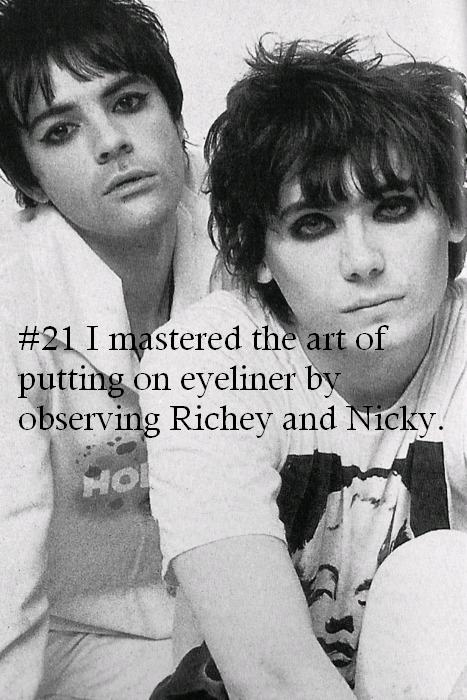
I found this somewhere on tumblr years ago, and it couldn’t be more true for me, hell I didn’t even wear eyeliner before them!
As I already said, the first song I heard by the Manics was Little Baby Nothing. It’s a really catchy tune with a colourful video full of slogans and it’s a duet with ex-porn star Traci Lords which is really appropriate because the idea that influenced that song was cheap sex, that is, the sexual exploitation of women: “Your beauty and virginity used like toys (…) little baby nothing/ loveless slavery, lips kissing empty/ dress your life in loathing…” Manics needed a symbol, somebody that could sing the lyrics and represent them simultaneously. In an interview from 1992, Nicky said the song was about “a woman who had power and intelligence and was used by men”. I love the part sang by Traci Lords:
My mind is dead, everybody loves me
Wants a slice of me
Hopelessly passive and compatible
Need to belong, oh the roads are scary
So hold me in your arms
I want to be your only possession
No god reached me, faded films and loving books
Black and white TV
All the world does not exist for me
And if I’m starving, you can feed me lollipops
Your diet will crush me
My life just an old man’s memory
And the line “Moths broken up, quenched at last” is an interesting one and a direct reference to Tennessee Williams’s poem “Lament for Months” which meant a lot to the Manics, especially to Richey Edwards, about the moths who are drawn to light which ultimately kills them, there’s that delicacy in moths. I know I’ve focused on their first album a lot in this ode, but it’s just because it was the first album I have listened to and the aim of this post was to share my memories of discovering Manics. I really love their second and third album as well, as well as many songs from all the following albums, but I am a fan of their early years when Richey was still in the band and his influence was evident, both lyrically and stylistically; he was the most glamorous of them four.

Now let me share some of my favourite lyrics, first from the song “Stay Beautiful”:
Find your faith in your security
All broken up at seventeen
Jam your brain with broken heroes
Love your masks and adore your failure
(…)
Your school your dole and your chequebook dreams
Your clothes your suits and your pension schemes
Now you say you know how we feel
But don’t fall in love cos we hate you still
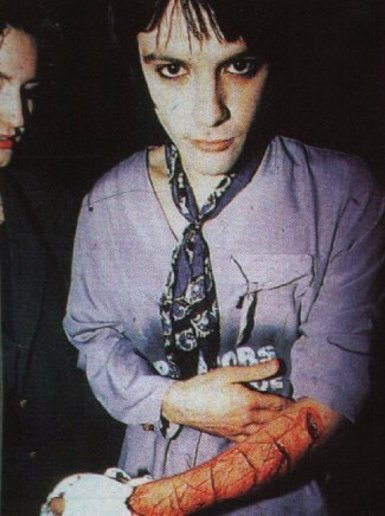
From the song 4st. 7lbs:
I wanna be so skinny that I rot from view
I want to walk in the snow
And not leave a footprint
I want to walk in the snow
And not soil its purity…..
I choose my choice, I starve to frenzy
Hunger soon passes and sickness soon tires
Legs bend, stockinged I am Twiggy
And I don’t mind the horror that surrounds me
Self-worth scatters, self-esteem’s a bore
I long since moved to a higher plateau
This discipline’s so rare so please applaud…
Yeah 4st. 7, an epilogue of youth
Such beautiful dignity in self-abuse
I’ve finally come to understand life
Through staring blankly at my navel
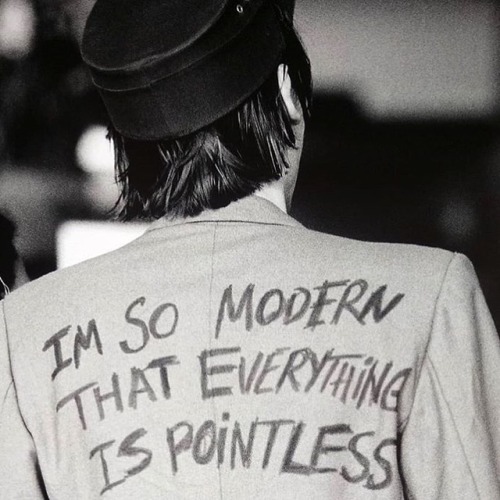
Nicky Wire in 1994
Wreckage inside all that’s real
Another bought product, no reality
Passive consumers with patrolled desires
Mindless countdown to retirement
(Methadone Pretty)
Richey with Nicky Wire, photographed for Select magazine in London, United Kingdom, 30 April 1993
My favourite from the second album is “From Despair to Where” which is also a single. It’s a song that, according to Richey, refers to the western concept of despair which isn’t realistic because everybody has a good living conditions compared to the third world countries, but most of the people feel disappointed with their lives for they didn’t reach any kind of fulfillment what so ever, they just feel let down; by life, universe, society, by the impossible dreams they had built themselves. As Richey said in an interview: “Everyone feels that melancholia regularly.”
I write this alone on my bed
I’ve poisoned every room in my house
The place is quiet and so alone
Pretend there’s something worth waiting for.
There’s nothing nice in my head
The adult world took it all away
Wake up with the same spit in my mouth
Cannot tell if it’s real or not.
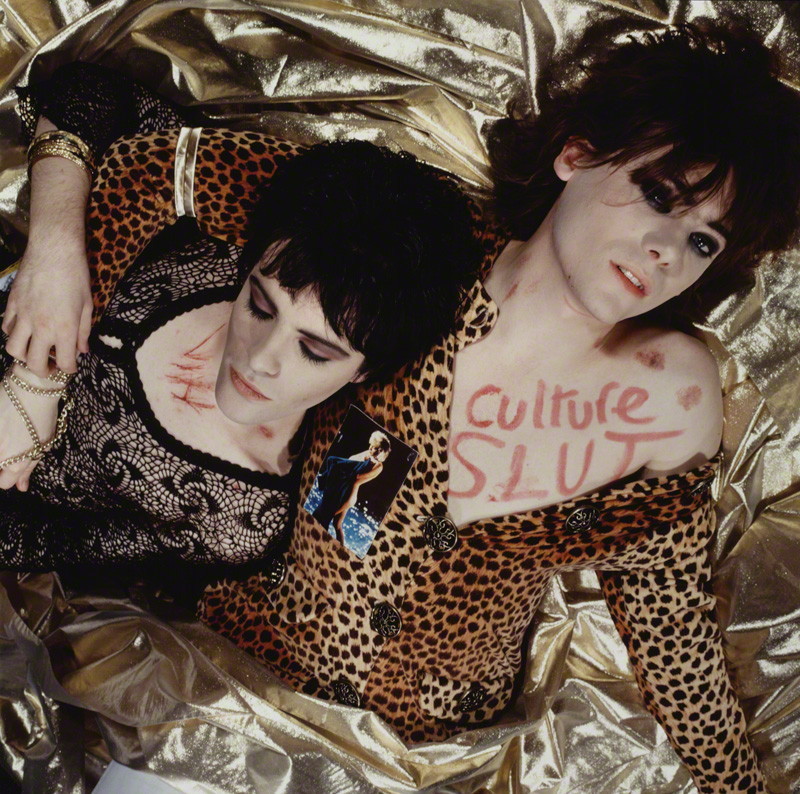
Richey and Nicky looking elegantly wasted, by Kevin Cummins for NME cover 1991
Song “She bathed herself in a bath of bleach” is from the album “Journal for Plague Lovers” released on 18 May 2009 (the anniversary of Ian Curtis’ suicide), and all the songs on the album were written by Richey Edwards, the lyrics he left behind before he disappeared.
She’d walk on broken glass for love
She thought burnt skin would please her lover
To keep love alive and lust beside
Kind people should never be treated like
Empty arms and naked heart
The love she sought through faltering thought
Table for two, such a sweet delight
Whispers “I love you my darling” tonight

Song “Hibernation” is a B-side to “From Despair to Where” and it shows Richey’s vision of adulthood; its chase for money, pointlessness and marriage without love, life with no flair and lived like a repetitive routine of boredom:
This stage of our career
Things get tight
A ring helps get a mortgage
To move out of daddy’s home
Get a bigger car
Easy access to the city
I can read the papers in peace
And laugh at the homeless
I know my friends criticize
But we get by OK
So what if there’s no emotion
We can wake up anywhere
There’s never a row
No time for a kiss
When you’ve got schedules to meet
Trivialities seem so cheap
This is above love
This is more than real
This is all there is
This is as good as it gets-
Intense morality parades
Listening to the Manics now, after five years, is a nostalgic experience, and to end this ode I chose a song called “This is the day” which deals with a similar theme. It was originally written by the band The The in 1983, not the Manics, but if you watch the video, you’ll see how much it means to them because they’re remembering Richey and their early days. And this line is specially meaningful for me: “And all the money in the world couldn’t bring back those days”. Sometimes I wish my mind was a tabula rasa again and I could have the pleasure of discovering the Manics, Kerouac and Rimbaud for the first time, and to feel that rapture again!!! I am the kind of person who has been in search of lost times since she was five so even if I am very happy now I tend to be especially nostalgic for everything that passes. So, to me, this video represents not only the history of the band, but also the history of my love for the bend:
You didn’t wake up this morning cause you didn’t go to bed.
You were watching the whites of your eyes turn red.
The calendar on your wall is ticking the days off.
You’ve been reading some old letters,
You smile and you think how much you’ve changed,
And all the money in the world couldn’t bring back those days.
You pull back the curtains, and the sun burns into your eyes,
You watch a plane flying, across a clear blue sky.
This is the day your life will surely change.
This is the day when things fall into place.
You could’ve done anything, if you’d wanted
And all your friends and family think that you’re lucky,
But the side of you they’ll never see
Is when you’re left alone with the memories
That hold your life together, together like glue.
I believe I would have been a different person today had I not discovered Manic Street Preachers. They appealed to me so much because of things that were inherently in me, but they also shaped the way I see life and world, and art to an enormous extend and I am endlessly grateful for that!
Tags: 1990s, 1992, 1993, 1994, 21 years of living and nothing means anything to me, anger, angst, anniversary, black eyeliner, Blackwood, books, British rock, despair, DIY, education, From Despair to Where, Generation Terrorists, glam, glam twins, James Dean Bradfield, Little Baby Nothing, Manic Street Preachers, memory, Motorcycle Emptiness, Motown Junk, music, Nicky Wire, personal, Richey Edwards, rock n roll, Sean Moore, Wales, white jeans
 John William Waterhouse, Miranda, 1875
John William Waterhouse, Miranda, 1875










